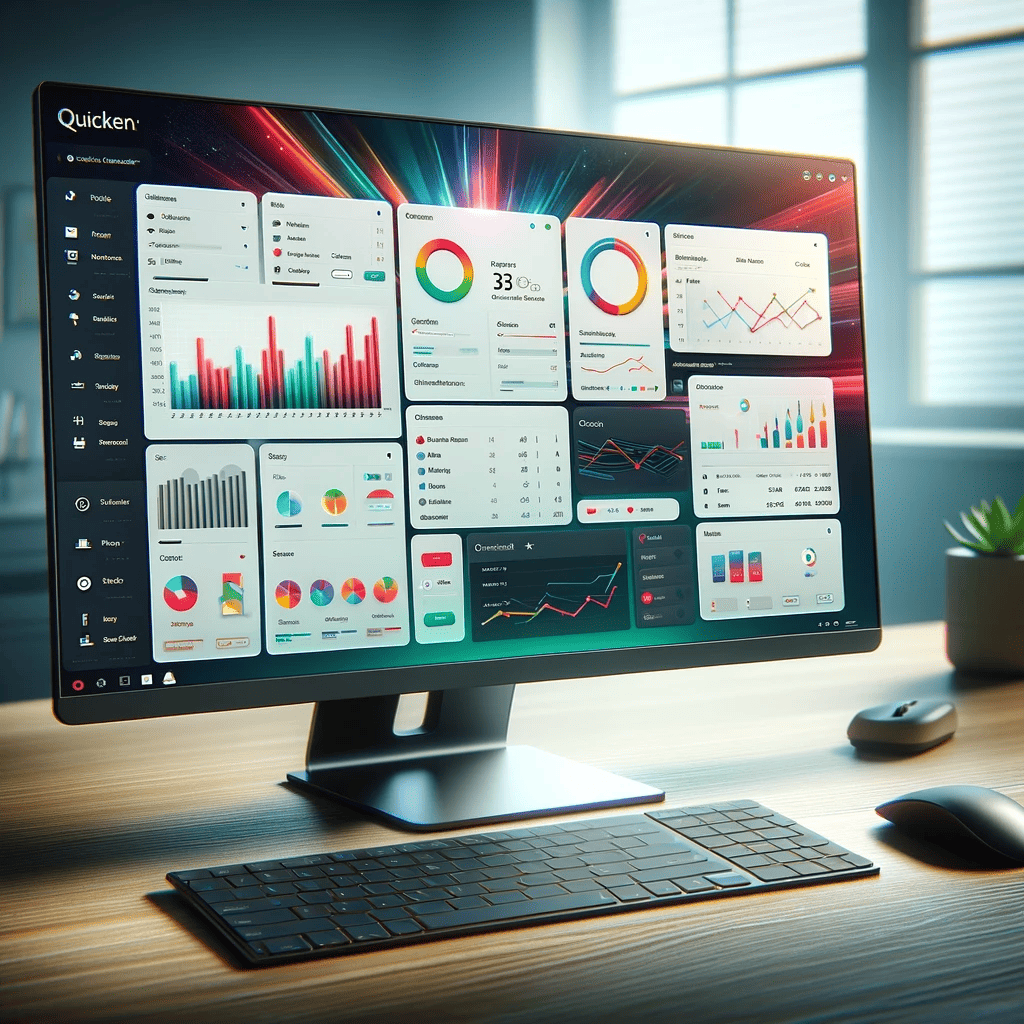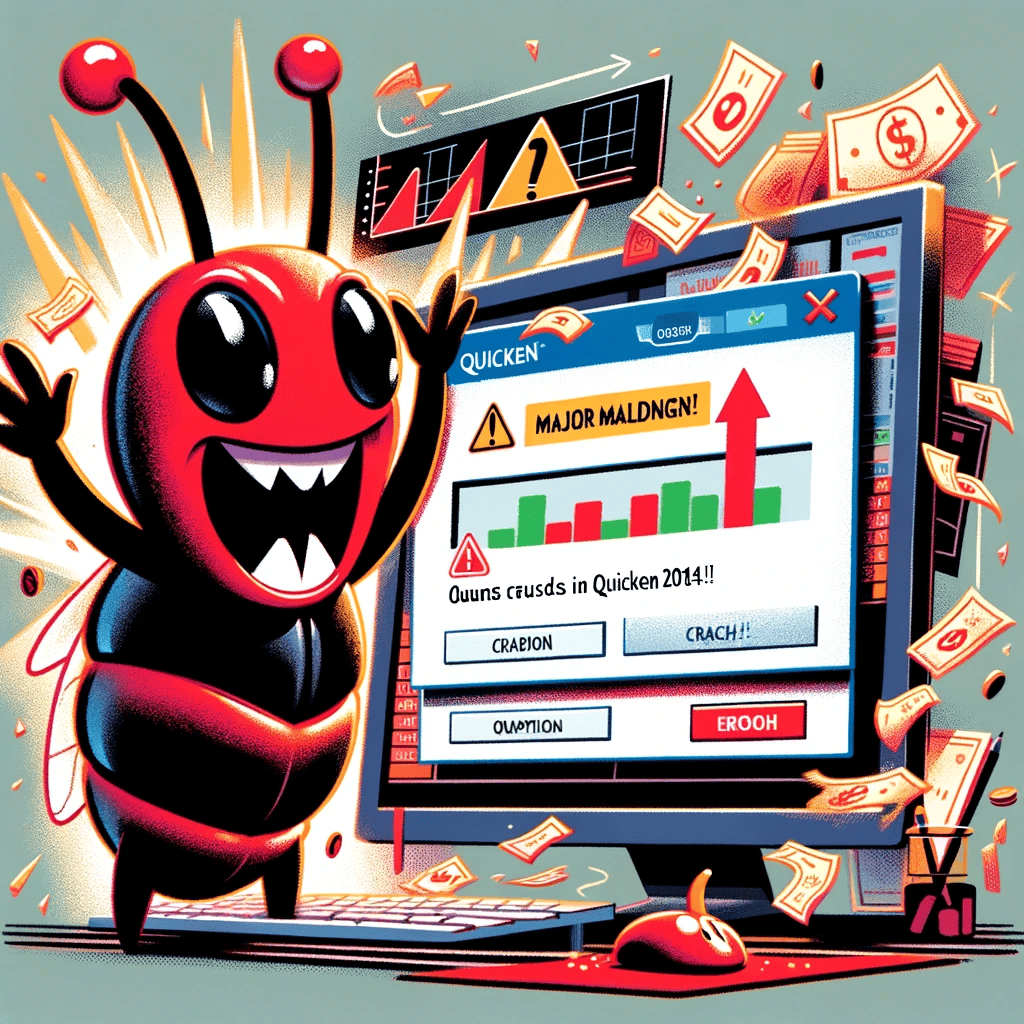Well, I have now been using Quicken for thirty years, spanning three operating systems. I can’t think of any other software I’ve used this long. I started with Quicken for DOS, moved to Quicken for Windows, and eventually landed on Quicken for Mac.
Quicken comes from an era when software was useful, comprehensive, and required reading the manual. But, the people of today don’t read instructions. Modern software is overly simple, laser-focused on a few things, and all two features are discoverable. The Quicken program, as powerful as it is would not be written today.
Quicken for DOS

My personal finance tracking started when Dad brought home an old computer with a monochrome amber monitor. It had QBasic (with two games: Gorilla and Nibbles), WordPerfect for DOS (which is the greatest program ever written to this day), and Quicken for DOS, and I purchased my favorite program of all time: Microsoft Flight Simulator. Anyway, Dad showed me how to maintain a ledger. I set up two accounts:
- Cold Hard Cash (my wallet)
- Bank of Dad (self-explanatory)
The basic theme of stewardship is that we are responsible before God for how we use the goods, services, and resources that are at our disposal. That means that a Christian steward is to be careful not to be wasteful with them. We need to measure the value of things we buy
— R. C. Sproul, How Should I Think about Money, 1st Ed
(free digital version available at Amazon or Ligonier)
Quicken for Windows

I switched from DOS to Quicken for Windows in 2000 (give or take), and it went along nicely for the next 14 years. Quicken is so comprehensive that it has tools to handle every scenario Kris and I have come across:
- Cash management (categorizing transactions, monitoring spending, billpay, etc.)
- Automatic downloads and auto-reconciliation from Financial Institutions
- Expense Tracking.
- Budgeting.
- Investing – Brokerage accounts (Capital gains tracking, lot tracking for tax loss harvesting, etc.)
- Multiple Currencies
- Retirement Planning (I don’t ever plan to retire since I don’t see a biblical precedence for it. God intended us to work. But I think it’s wise to invest for such since one never knows how capable he will be in the future).
- Business transactions/invoicing clients.
- Buying a house/home loan/looking at early payoff what-if scenarios
- Tracking assets (cars, houses, etc.), and depreciating assets.
- Becoming an accidental landlord
- Itemized taxes, importing data into Turbotax.
- Memorizing transactions based on rules (which is mostly automatic). There’s very little manual data entry as most things are automated.
- Tracking medical bills and matching them with health insurance reimbursements…
“Sir, I’m not trained in medical codes.”
— Ben’s Health Insurance
Now, we must pause here and take this moment to rant about health insurance –> The health industry is disorganized–sometimes you don’t get invoices until a year after the service that you thought was all paid for from the sub-sub-sub-contractor of your doctor, and in the meantime, your employer switched health insurance providers in the middle of it, and sometimes you’ll get duplicate invoices and if you’re not keeping track of it you’ll pay them twice–sometimes you’ll get past due statements out of the blue from a collection agency having never received an invoice, and you’re wondering who are these people and why do I owe them money? The statements have no valid medical or diagnosis codes, and then the insurance won’t reimburse you unless you Fax that over. Yes, I said Fax because that is the only secure method to send medical codes other than snail-mail. So you sign up for a Fax service. But you don’t know the medical codes–the provider gave them codes that they insist are good, but the insurance says they’re the wrong codes. The biller doesn’t know what codes the insurance is looking for, but that’s not their problem; you’re the “responsible payer” so they still want their money. So you pay them so they don’t ruin your credit and you’ll just have the insurance pay you back later. You offer to help by writing the proper codes on the invoice and re-faxing it to the insurance company. But your insurance doesn’t want to tell you what the correct codes are because that’s a secret. Nah na na Nah na na. You Google and find a few codes but after a few months the insurance sends you a “Nope, that’s not the right code” letter. You begin to suspect that only one person in the world knows the codes, and he’s dead. So you arrange a 4-way conference call between yourself, your insurance, your provider, and the sub-sub-sub provider. If they won’t tell you the secret codes, maybe they’ll at least share it with each other. If they wanted to be secure they could even Fax the codes like secret agents. But the representatives are all in outsourced call-centers in foreign countries speaking broken English and all reading off scripts to each other–finally, you realize you’re not the customer here at all because you’re not paying for the insurance directly, your employer is. So you talk to your HR department who goes on the war path. They find out that even though the doctor is in-Network, and the Sub-contractor is In-Network, the Sub-Sub-contractor that hired the Sub-Sub-Sub Contractor is not In-Network even though the Sub-Sub contractor is. You should have asked. Your fault. Pay up. Wait a minute… it shouldn’t matter; because (1) you’re on the PPO plan and (2) you went way over max OOP. It should be covered. So you tell HR that. “Oh, you were on the PPO plan? Yep you were.” Anyway, a few weeks later HR gives you good news. They convinced the insurance company to reimburse you. Yay! That’s one of 14 bills your insurance needs to pay out, but getting one covered is a good start! So you wait for a check. Four months later you finally get the check. You open the check. You look at the check. The check insults you. Why is it only $25.00? That covers 0.008% of the bill. You call them up–yes, it was somehow coded as a doctors visit and that’s the agreed upon rate. At this point you start adding up how much you’ve paid in premiums over your lifetime and realize if you had simply invested your health insurance premiums in the S&P 500 instead, you’d not only be able to pay for this out of pocket, but you’d have an extra couple million dollars which is well over the maximum insurance lifetime payout anyway. But, you decided to pay the premiums. And that means you really need insurance to cough up a little more than $25. Literally, insurance has one purpose, and it is not meeting that purpose. So you warm up your fax machine and get on the phone and start the process all over again. Despite being a little upset at your health insurance for making you go through all these hoops, you’re just thankful to have Quicken to keep all this organized. Quicken’s robust AR and AP capabilities are useful not only to small business owners but also to medical patients.
Quicken won’t stop medical bills from making you go broke, but it does a fantastic job at tracking how broke you are.

Nothing is more important than your health… except for your money.
– Ferengi Rules of Acquisition #23
…
Quicken 2012 is the best release Quicken has ever made to this day. There is no contest. Unfortunately, you can’t run old versions and synchronize with bank data.
I don’t know what happened to quality, but it appears to me that after Intuit acquired Mint, Quicken lost focus, made too many changes, and introduced simplicity in such a way it made things slow and more complex. It’s like they tried to add features from Mint… but Quicken is not Mint and the two different methods of finance management are incompatible. Quicken 2014 is the buggiest release ever made. While I am a huge fan of Quicken there is an 8-year span between 2014 and 2022 I would not have recommended Quicken very highly, but I don’t know of any alternatives. I still managed to make it work for us until I hit some limit in 2021…
The Great Quicken Crash of 2021

In 2021, Quicken kept corrupting my data. I had a good file, but then if I added a few transactions, it would corrupt the entire file, and Quicken would crash and not be able to open the file again. With decades of data, maybe I went past the 10,000 GDI limit, or maybe I went over 2,147,483,648 transactions, hitting a 2^32 (signed) limit somewhere. Who knows? I returned to older backup files, and I deleted older transactions to make the file smaller, but every time I’d sync up my latest transactions, it would crash.
I gave up for a while–I tried to use Mint (now defunct). I’d say Mint is good at tracking spending, but it is not that good at overall finance management, and it couldn’t do basic investment tracking. It isn’t that good to fly blind, but Mint was better than nothing.
Quicken for Mac
Sixteen of the thirty-eight parables of Jesus deal with money. One out of ten verses in the New Testament deals with that subject. Scripture offers about five hundred verses on prayer, fewer than five hundred on faith, and over two thousand on money. The believer’s attitude toward money and possessions is determinative.
― John F. MacArthur Jr.

After switching back to Macs earlier last year, the thought occurred to me that Quicken for Mac might be more robust. It turns out a different team writes the Mac version. I bought Quicken for Mac and imported all our Quicken Windows data from the last good backup in 2021. I synchronized transactions to catch up (which is what crashed Quicken for Windows), and it worked! I then imported the last two years of lost data from Mint (unfortunately, Mint doesn’t track everything correctly, so I had to do a few balance adjustments. It’s annoying to have a gap but I don’t think I’m missing too much data), and we’re back in business!
What I like most about Quicken for Mac is it’s not an Electron app. My hats off to any app that is not built on Electron.
Secondarily, it’s the most comprehensive finance app I know that doesn’t crash or slow down when loaded with decades of personal financial history.
Quicken is fully Mac native and insanely fast. Certain financial transactions that would hang Quicken for Windows for several seconds are instantaneous on the Mac version. The backend is no longer a proprietary file but a standard SQLite database–I was able to open it right up in an SQLite DB browser.
A few thoughts on Quicken for Mac vs. Windows.
- 🍎 The Mac version has not crashed even once. More importantly, it hasn’t corrupted my data. If you’ve been using Quicken for Windows for 30 years and keep having trouble with it crashing and being unstable, give the Mac version a try.
- 🍎 The Mac version is faster.
- 🍎 For Brokerage accounts, I ran into precision limits in Windows; sometimes, this has caused the number of shares between Quicken and my Brokerage to become mismatched due to rounding, which is quite annoying when you’re doing lot tracking and over time you end up off from what you need to report on taxes. The Mac has more digits of precision. I tested to 8 digits after the decimal without issue (incidentally, that’s enough to track cryptocurrencies like Bitcoin). In Windows I constantly had to add placeholders due to rounding issues. So far, not a single investment transaction has gone out of sync on Mac. I haven’t had to enter a single placeholder to correct a holding.
- 🍎 The Budgeting feature on Mac is slow when doing calculations (but it’s even slower on Windows), and the interface is clunky. You can’t edit a budget directly from the budget screen but have to go into edit mode (why?). I’d say budgeting is very cumbersome on Mac and Windows–2012 was the last version of Quicken with a robust budgeting tool. Quicken for DOS puts both to shame.
- 🪟 The Mac version does not have great support for Business. There is no Rental edition, they just added a Business edition but it doesn’t have a lot of features yet. This is not a huge problem because you can still create categories mapped to items on Schedule C and E. You can easily create tags to track multiple businesses.
- 🪟 The Windows version allows you to create custom Asset classes–can’t do that on Mac.
- 🪟 A large feature missing from the Mac version is Invoicing. I use the invoicing and receivables feature quite a bit, so I will miss this. I can still maintain a separate Quicken for Windows file to generate invoices, so it’s not a big deal but a bit annoying.
- 🪟 I can’t seem to find a mass Find/Replace feature in Mac. Windows is a lot better here
- 🍎 …But since this is a database on the Mac, you can just write a SQL query to do it.
- 🍎 E-Billing. I never could get E-Billing to work right in Windows, but it works fine in Mac, even bringing in PDFs of the bills.
- 🪟 Scheduled transactions often double-up from downloaded transactions (Windows did better at matching them automatically), but on Mac you can drag the transactions into each other to match.
- 🍎 Mobile sync is more robust on Mac. Every time I did a sync to mobile on Windows, it would complain about corrupted transactions (I suspect from there not being enough decimal precision on brokerage accounts). So far, I have had no warnings syncing to Quicken for iOS.
- 🪟 On Mac there are too many sync connectors for each financial institution with no documentation on how they differ–on Windows, it is pretty straightforward. But on Mac, I’ll sometimes see 3 or 4 connectors for the same bank, and you just have to try them until I find one that works. A description of what they do would be nice.
- 🪟 The projected balance on Mac works fine for one account at a time (this works for me because I mainly care about the balance in the main account), but Windows can do projected balance and cash flow management for multiple checking accounts on one screen.
- 🪟 The scheduled transfers (Bill payment prediction) on Mac can’t predict credit card payments based on the current balance–a standard feature in Windows. Now, it will bring in the statement balance for most banks, so it’s only a minor issue for the few banks that don’t sync that info to Quicken.
…
Overall, between the two, I would pick the Windows version (even running it under Parallels) for the extra Business (especially invoicing) features, but since I literally can’t move past the year 2021 in the Windows version without it crashing, I’m using the Mac version and maintain a separate Windows Quicken file just for invoicing. The Mac version of Quicken lacks some features of the Windows counterpart but is a more stable program.

Quicken is the worst personal finance management tool, except for all the other ones that have been tried.
– Winston Churchill
(Well, he would have said that if he were still alive today)
Amazingly, Quicken has survived several acquisitions and a disaster of merging with Mint’s culture (but not without a lot of damage to it’s reputation). In recent years Eric Dunn took over leadership of Quicken and it does seem like he’s done a good job at restoring Quicken’s culture and bringing focus back to quality of the product. For awhile I wasn’t sure Quicken even had a roadmap other than to make things slower and buggier with each release. But I appreciate that he has been providing good direction and communicates the overall roadmap with the user base.
Quicken (now Quicken Classic) is the most comprehensive personal finance program ever written. Hopefully, it will be around another 30 years.
Hebrews 13:5 (NASB) –
Make sure that your character is free from the love of money, being content with what you have; for He Himself has said, “I will never desert you, nor will I ever forsake you.”
I don’t remember the year but I was a beta tester for Quicken. using my AT&T 6300 I did all the books for my 2 ice cream shops. Back then Quicken was little more than a electronic ledger. Quicken worked without error back then. I only wish that were the case today.
Nice, you may have beta tested the first version of Quicken I used!
Wow, 30 years of Quicken! I’ve been using the software for over a decade and it’s been a game changer for my personal finance management. I love how it allows me to track my spending, create a budget, and stay on top of my investments. The interface has evolved over the years, but the core functionality has remained the same and it’s still the best option out there for me. Thanks for sharing this milestone and for continuing to provide such a great product!
Thanks TechyList. It’s always good to meet other people who use Quicken, we’re few and far between.
Really great and informative article. Thank you. I dislike the Quicken Windows version because it is so slow, especially for bulk transactions. I have big gaps in my records and I would like to bring them all up to date (mostly from PDFs because some gap periods are older than 18 months). I want to be able to analyze them better.
Is there a direct converter to convert Quicken Classic Windows to MacOS Quicken SQLite format, WITHOUT USING the MacQuicken package as a import/export conversion tool?
Hi, Rich. Interesting that your experience is the same as mine on Windows–the gaps are frustrating when you spend decades keeping meticulous records. I don’t know of a tool–I had Quicken Classic for Mac do the conversion for me…and most of it came through okay. It seems like some of the account types weren’t correct but I created the correct accounts and was able to select all and copy/paste the transactions.